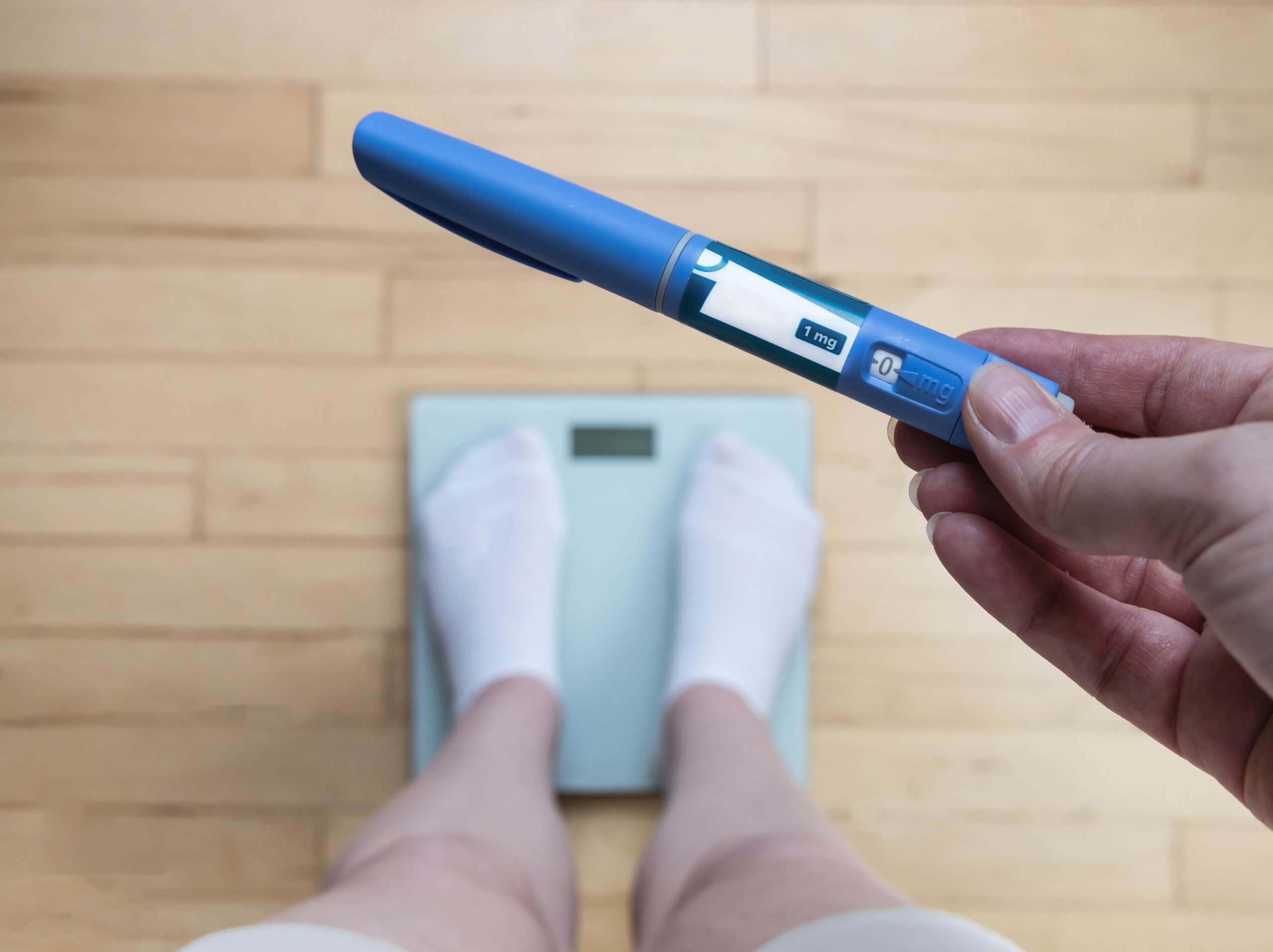Weight Loss Medication


How do weight loss medications work?
Weight loss medications act in a variety of ways to help patients lose weight and maintain their weight loss. They reduce hunger and appetite and help patients feel full quickly so that they can eat smaller portions, make healthier food choices and minimise snacking between meals. Some medications help with food cravings as well.
Weight loss medications for obesity are only effective if they are combined with sustained lifestyle change. Patients generally do better if they are also working with a team of health professionals such as the team of doctors, nurses and dietitian at Upper GI Surgery, alongside their GP and other professionals such as a psychologist and an exercise physiologist. At Upper GI Surgery we are committed to the health and wellbeing of our patients and are keen to support and walk alongside our patients as they manage their obesity well.
Am I a candidate for weight loss medication?
Weight loss medication can be used for people who wish to lose excess weight without surgery, those who may have experienced weight regain after surgery, or are having difficulty managing their weight long-term.
Adults with excess weight (BMI > 27) who also have weight-related medical problems (such as high blood pressure, type 2 diabetes, sleep apnea) or adults suffering from obesity (BMI > 30) may be eligible for weight loss medication.
If you are considering weight loss medication, the next step is making an appointment with one of the doctors at Upper GI Surgery – they will discuss the medications for weight management that are available for you and choose the medication that is most appropriate for your individual needs.
Weight loss medication – potential side effects
Most of the medications for weight management cause some gastrointestinal side effects such as nausea, constipation or diarrhoea. To avoid this as much as possible, most medications are started at a low dose and increased slowly to allow these to settle, determining the optimal dose for each patient to balance side effects while losing weight to achieve their goals, set in consultation with a doctor.
How effective is weight loss medication long-term?
It is important to understand that after a time, weight reaches a maintenance state and from that time the medication helps prevent weight regain rather than continuing to cause further weight loss. If the medication is stopped then it is likely that your weight will start going up again and over time you may regain all or most of the weight you have lost.
This is because our brain remembers our maximum weight and changes the hormones to drive the weight back up again. This is part of the normal pattern for Obesity so your doctor understands that long-term weight management is hard at times. We encourage patients to reconnect with our team if their weight is tracking up more than 3kg so we can help before it tracks up any further.
Weight loss medication costs
One of the considerations to discuss with your doctor is the cost of weight loss medications as they are not subsidised by the Australian Government on the PBS. The cost of weight loss medication will vary depending on the specific medication and the optimal dose that the patient requires – increased dosage increases the cost of the medication.
In recent times, some weight loss medications have been in short supply in Australia and globally, so you may need to swap to another medication for a time until the original medication is available again. (For patients – if this happens to you, please contact our rooms to arrange an appointment so we can review your treatment).
If you would like to speak with our bariatric care specialist about weight loss and weight management medications, please call us to make an appointment on (02) 9553 1120.
Weight loss medication for weight regain after bariatric surgery
Although bariatric surgery is a fantastic tool used to aid in weight loss, it requires important lifelong commitments to a change in diet and activity levels (exercise) to be effective in the long term. Even with consistent healthy lifestyle changes, some weight regain can and does recur.
Typically, some weight regain can be expected to occur after 12-24 months, and while in some the weight gain is minor, in others it is progressive which can be very disheartening. From our clinical experience, patients who attend regular follow-ups with their clinic, tend to regain less weight than those who don’t come back for follow-ups.
If someone is struggling to lose weight they have regained through diet and exercise alone, non-surgical weight loss treatments can help them get back on track and lose the regained kgs. Weight loss medications can assist with things like hunger and weight loss while you work on some of the “triggers’ that have led to weight regain.
If you would like to speak with the Bariatric Care Specialist about weight loss and weight management medications, please call us to make an appointment on (02) 9553 1120 or
FAQs
Are weight loss medications safe?
If you experience nausea, we advise that you eat smaller meals, avoid fatty foods and take your time to eat more slowly. There are medications our doctors can also prescribe to help with nausea. If you experience constipation, increase your fluid intake, eat more vegetables, consider using a fibre supplement such as Metamucil and if you still have constipation you can use a laxative such as lactulose or movicol.
You shouldn’t increase your dose of weight loss medications until your side effects are under control. More serious and troublesome side effects and complications occur in about 1 in 200 patients which is a similar rate to a wide range of commonly prescribed medications for other health conditions. You can visit the website of your prescribed weight loss medication, to learn about the risks in more detail.
How long do I need to take weight loss medication?
Some patients are able to stop weight loss medication and keep weight off if they continue to work on lifestyle management strategies. Other people do better with continuing on medication, often at a lower dose or with intermittent dosing, alongside lifestyle management in the longer term. It is important to monitor your weight regularly as you may need to restart your medication if your weight increases more than 3kg after stopping.
How long can you use weight loss medications?
Weight loss medications can be used long-term, with many studies showing that they are safe and effective for use over extended periods, including 2 years or more. However, the challenge with long-term use is the cost, as they can become relatively expensive.
It’s worth testing de-escalation strategies, such as reducing the dose or using intermittent dosing to lower the cost. Increasing exercise can also help boost your metabolic rate and complement the medication. Medically, it’s safe to use these medications long-term, but it’s helpful to explore ways to manage the financial burden while still achieving effective results.
What are the long-term effects of weight loss medication?
If you use weight loss medications and don’t eat a proper diet (including eating adequate amounts of protein and a wide range of fruit and vegetables), don’t drink adequate fluids or exercise (including resistance exercises), you will be at risk of muscle and bone loss or vitamin and mineral deficiencies.
How much weight can I expect to lose with medication?
Is weight loss medication covered by insurance?
Can I take weight loss medication if I have diabetes?
Are weight loss medications suitable for older adults?
If a GP says the drugs won’t work if you don’t have any appetite, is that true?
This is often the case. If you don’t have much of an appetite and are still struggling to lose weight, it could indicate other factors at play, such as unacknowledged snacking or a metabolic rate issue. However even in these situations, it’s still worth trying the medications because they do more than just suppress appetite.
They can help reduce your overall interest in food, which allows you to unconsciously eat less. Additionally, they alter the way your body uses glucose, which can further support weight loss.
How soon post-surgery would you recommend weight loss medications?
The timing of introducing weight loss medications post-surgery depends on several factors including the type of surgery, the amount of weight lost, and individual progress. A key concept in weight loss surgery and in weight loss treatment in general, is that you can predict how much weight someone will lose based on their initial progress in the first 3 to 4 months.
For example, with sleeve gastrectomy, the goal is usually for patients to lose about 30% of their total body weight. A target of 15% weight loss should occur in the first 3 to 4 months. If the patient has not reached 15% by that point, it may suggest they may not achieve their full weight loss goal, and WLM could be considered at that time.
For most patients, the first 12 to 18 months post-surgery is the key window for weight loss. If progress slows down significantly or a plateau persists, introducing medications may be appropriate to support further weight loss.
In cases of revision surgery such as switching from sleeve to bypass, weight loss may take longer to achieve so it might be reasonable to consider starting WLM earlier, once the patient is on normal food.
Should I go to my GP for weight loss medication or UGIS?
It depends on your GP. Dr Jenny Matthei is a General Practitioner (GP) with a specialist interest who has retrained as a weight loss physician and focuses solely on weight loss management. She is happy to supervise patients through the process.
However, many GP’s are generalists and may feel less confident managing patients who are using weight loss medications. It’s often a good idea to start by consulting your GP, but if they are not comfortable with or interested in this approach, you can always make an appointment with Jenny.
A common pitfall when using WLM with your GP is that without the proper diet and lifestyle plan, you may not reach your weight loss goals for several reasons. First, if you use WLM without a high-quality diet, you may lose protein and muscle mass along with fat. This can contribute to increased fatigue, which can be even worse if you’re not eating the right vitamins and nutrients. Losing muscle mass also lowers your metabolic rate.
For the best results, it’s crucial to combine WLM with the right diet and exercise plan to maximise your success. GP’s often don’t have the resources to provide all of these components, but at UGIS we offer everything in one place, with Jenny providing the necessary prescriptions as well as guidance on diet and exercise.

Why Choose Us

3 Years of Follow-up Appointments
Our patients benefit from having access to follow-up appointments with a Bariatric Specialist for up to 3 years after surgery, which is included in the clinic fee.

Over 20 Years of Experience
Our Bariatric surgery expertise is second to none. We have Australian-leading experience in many procedures, including the less commonly performed complex revision and robotic surgery.

Our Dedicated Support Team
Our welcoming and committed team is comprised of Nurses, Dietitian and Psychologist, as well as Admin support staff, making sure you are in the best hands for the duration of your treatment and the crucial aftercare period.

Ongoing Care Program (OCP)
Our Ongoing Care Program provides continuous support, offering access to helpful resources and expert guidance to ensure you stay on track and achieve lasting success in your weight loss journey.

Bariatric Centre of Excellence
Surgical Review Corporation (SRC) accreditation is achieved by providing the highest quality of care to patients as determined by an independent, external process of evaluation.

Bariatric Surgery Registry (BSR) Leading Contributors
We have contributed data since the BSR was first available in NSW and are pleased to report that our audit results are excellent. Audit is part of the “quality mindset” driving us towards excellence.
VLED (Very Low-Energy Diet)
A very low-energy diet (VLED) or otherwise known as a very low-calorie diet (VLCD), replaces meals with commercially available drinks or bars. Used alone provides 600–800 calories per day, or in combination with a typical meal provides 1200 calories per day. Used frequently by specialist weight loss clinics, but requires supervision.
For long-term results, it is best given as part of a diet plan that will have the patient moving onto a supervised reduced-energy diet with exercise. It is one of the easiest and most reliable methods of rapid weight loss available if patients can be compliant, and is associated with the best long-term results.
At Upper GI Surgery, our Bariatric Care Specialist Dr Jennifer Matthei and Dietitian Tania Chaanine can discuss with you the option of a VLED to assist with excess weight or weight management.

Sign up to receive our free Bariatric Surgery Guide
Everything you need to know, including our clinic cost, procedure options and much more.

